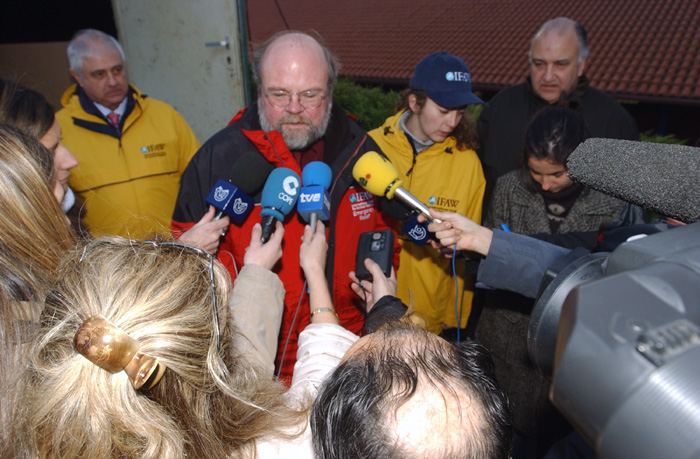
“Trade in bushmeat – the term given to meat of wild animals hunted from the forests, savannahs, shrub lands and wilderness areas of the world – is fast pushing endangered species to extinction,” said Swaziland RPCV Fred O’Regan, President of International Fund for Animal Welfare
IFAW Gives US$30,000 Donation to Boost Great Ape Survival Plan
Tuesday, September 03, 2002
(Johannesburg, South Africa – 3 September 2002) – The International Fund for Animal Welfare (IFAW – www.ifaw.org) today committed a US$30,000 donation to boost the work of the Great Ape Survival Project (GRASP). The donation was announced at the launch of GRASP during the World Summit on Sustainable Development (WSSD) in Johannesburg.
“Trade in bushmeat – the term given to meat of wild animals hunted from the forests, savannahs, shrub lands and wilderness areas of the world – is fast pushing endangered species to extinction,” said Fred O’Regan, President of IFAW, who spoke at the launch. “The great apes are among the species most under threat with the populations of three out of four of humankind’s closest relations having declined by at least half due to illegal hunting.”
IFAW announced that it had become an official partner of GRASP and that its initial donation of US$30,000 would, in part, be used to support a conference to be held in Kinshasa in the Democratic Republic of the Congo this month to work out a national survival plan for its great ape populations.
“The DRC is a vital range state of the great apes and this forthcoming conference in Kinshasa will be essential in allowing us to hammer out a plan to ensure the safety of these embattled creatures,” said O’Regan.
Recent research has found that as much as 1-million metric tons of bushmeat is eaten in the Congo Basin each year and, in Brazzaville, Congo, approximately 15,000 bushmeat carcasses passed through markets in 12 months – 293 of these were chimpanzees. Of equal concern is the illegal importation of bushmeat into European Union countries.
“To give just one example, some ten tons of illegal African bushmeat may be imported into the UK via Heathrow airport every day,” said O’Regan. “We would like to see EU institutions promote and enforce codes of conduct on EU-based logging companies, for example, and to see similar action taken in other parts of the world and major efforts made to stamp out illegal bushmeat imports.”
O’Regan also announced a further donation of US$10,000 in support of the work of the missions to Great Ape range states, led by the United Nations Great Ape envoys, Dr. Jane Goodall, Dr. Russell Mittermeier and Professor Toshisa Nishida.
“This is vital work,” said O’Regan. “IFAW believes if through GRASP and other initiatives we can guarantee the survival of the great apes, then we shall be tackling also the poverty and environmental degradation that affects the lives of so many in Africa and South East Asia where the great apes live.”
Ends
